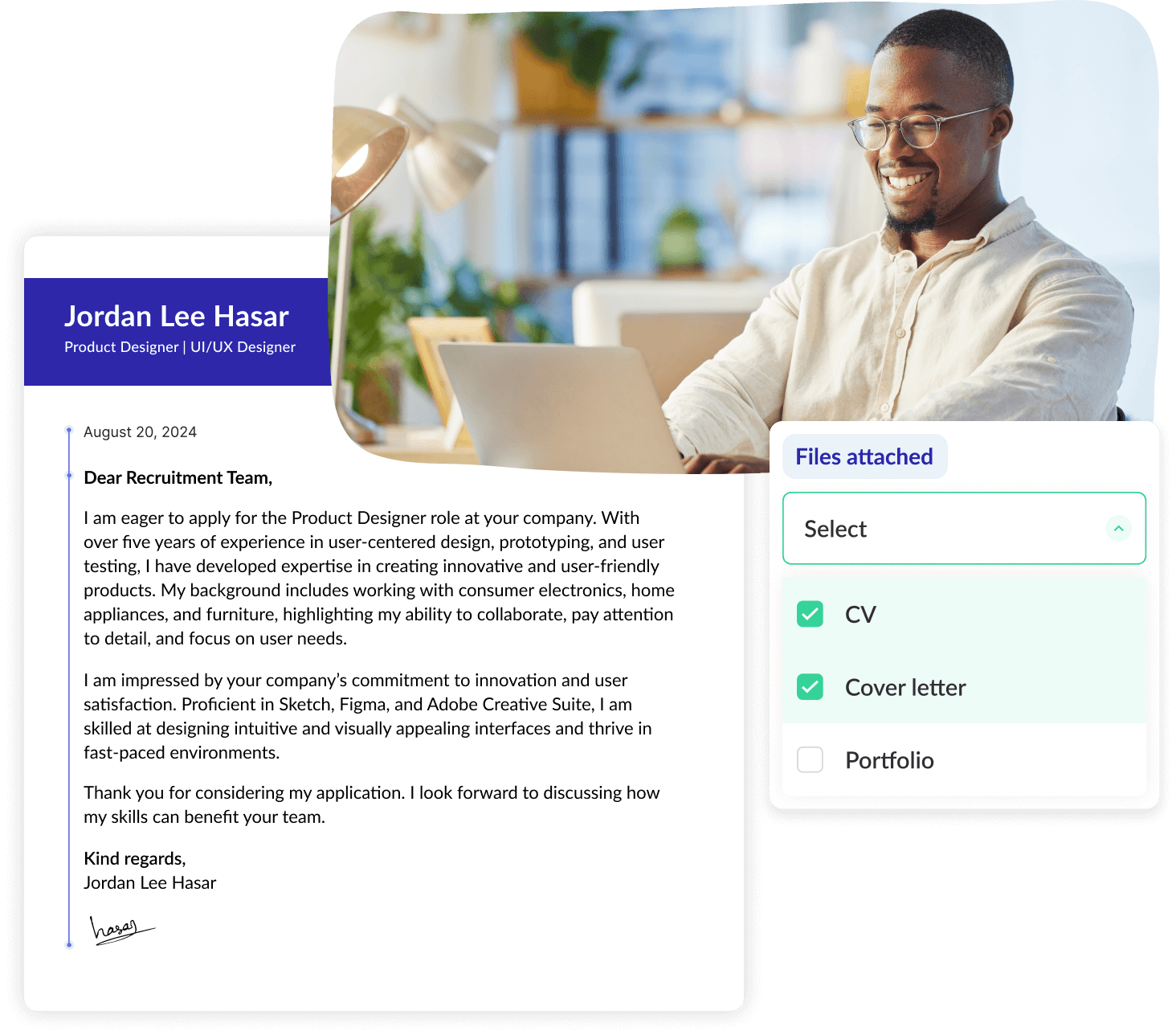
Use Exit Interviews To Improve Hiring
Learn how to get valuable insights to reduce turnover, improve the employee experience, and hire better.

You’ve finally found it: the perfect job. Your skills and experience align perfectly with the job description’s responsibilities and qualifications, and you’re excited about the company. You’ve already optimized your resume, but now it’s time to write your cover letter.
You want it to sound confident but not arrogant—personal, but not too personal—and striking the right balance can be tricky. Fortunately, this article will give you all the guidance, tips, and examples you need to craft a compelling cover letter that showcases your skills and helps you stand out from the other applicants.
Before writing a solid cover letter, you first need to understand what it is and why it’s important. Let’s break it down.

A cover letter is a document that applicants submit along with their resume as part of their job application. While your resume provides an overview of your skills and work experience, a cover letter offers a more complete picture of who you are and why you would be a good candidate for the role.
Did you know?
The Atlantic reports that the first job posting to ask for a cover letter appeared in a 1956 edition of the New York Times. The job? Industrial paint chemist at Dutch Boy Paints and applicants had to mail in their résumés.
The ultimate goal of a cover letter is to get the hiring manager to move you forward in the hiring process and interview you. It helps accomplish these objectives by:
Providing additional information and context. You can share extra details in a cover letter that don’t fit neatly on your resume, such as explaining gaps in your employment, highlighting specific achievements, or elaborating on particularly relevant skills, interests, or experiences.
Showing your personality. Your resume is all facts and figures, but a cover letter lets your personality shine through. You can share stories and express yourself more conversationally, giving the employer a more well-rounded picture of you.
Conveying your enthusiasm. A resume doesn’t convey a lot of emotion. With a cover letter, you can explain why you’re passionate about the role, what attracts you to the company, and how much you look forward to the opportunity.

They may seem old-school, but cover letters are very beneficial in the hiring process. They can help you:
Set yourself apart from other applicants. In a sea of generic, cookie-cutter cover letters, a personalized cover letter shows a potential employer that you go the extra mile and are genuinely interested in the role.
Show off your writing and communication skills. A well-written cover letter demonstrates to hiring managers that you can express your thoughts clearly and professionally. Communication is a valuable skill in almost any job, but particularly for writing-heavy fields like marketing, public relations, or education.
Make a strong case for yourself. If your resume doesn’t quite match all the job requirements, a cover letter is an opportunity to convince the employer to still give you a shot. For example, maybe you’re not proficient with the software the role requires. In your cover letter, you can share that you’ve enrolled in a course to build your skills.
What does an effective cover letter look like? The tone and voice of your cover letter should match the brand of the organization to which you’re applying. The following are examples of formal and casual cover letters.

Formal Cover Letter Template
Dear [Hiring Manager’s Name],
I was thrilled to discover the Executive Director position at Rising Tides when I heard about your recent fundraising campaign on LinkedIn. My name is [Your Name], and I have spent the past six years leading initiatives to support the education of BIPOC youth. For instance, at The Noah Project, I oversaw our partnership with National Bank, which lead to a 3x increase in registrations. This experience aligns closely with your need for someone who can build and nurture relationships with corporate partners.
In my previous role, I spearheaded a clothing drive initiative with local schools that engaged over 5,000 youth across the city. This directly connects with your goal of improving community outreach. I know my community building and organizational skills would be an asset to Rising Tides and help the organization achieve its objectives.
I’m excited to bring my expertise in project management and partnerships to Rising Tides. Thank you for considering my application. I look forward to discussing how my background and passion align with your vision and support your mission.
Sincerely,
[Your Name]
Casual Cover Letter Template
Hi [Hiring Manager’s Name],
I was excited to see the opening for a Business Development Representative at Stoopio after reading about your recent product launch in Tech Crunch. I’m [Your Name], and I’ve been driving growth at Stoopio by connecting with small business owners across the tri-state area. In just six months, I’ve helped grow our client base by 40%, with a 95% retention rate.
I also helped streamline our customer relationship management system, which helped us follow-up with leads 30% faster and improve our closing rate by 6%. I believe I could apply what I learned through this project to help Stoopio continually improve customer satisfaction.
However, what really piqued my interest in the role was your focus on supporting women entrepreneurs. My mom runs a hair salon and her passion and commitment has always inspired me.
I’d love to chat about how my experience and enthusiasm can help take Stoopio to new heights. Thank you for considering my application. I’m looking forward to the opportunity to connect!
Best,
Sarah
P.S. My mom’s salon is The Elle Spot on Culver Street. if you stop by, tell her Sarah sent you!
Section
Example
Tips
Greeting
[Your Name]
[Your Address]
[City, State, Zip Code]
[Email Address]
[Phone Number]
[Date]
[Hiring Manager’s Name]
[Company Name]
[Company Address]
[City, State, Zip Code]
Dear [Hiring Manager’s Name],
Address your cover letter to a specific person instead of using something generic like, “To whom it may concern.”
Lead Paragraph
I heard about the [Job Title] position at [Company Name] from [Referral’s Name] and couldn’t wait to apply. My name is [Your Name], and I’ve spent the last [number] years honing my [industry] skills, including a project at [Previous Company] where I [share a brief, engaging story about a notable achievement, like launching a successful campaign or driving significant engagement]. Your recent [mention a specific campaign or initiative by the company] caught my eye and aligns perfectly with my experience in [related field or skill].
Start with something that will grab their attention. This could be the name of the person who referred you, an interesting fact or anecdote about your experience, expertise, or an impact you made in a previous role.
Closing Paragraph
At [Previous Company], I led a [describe a relevant project or accomplishment], which resulted in [briefly explain the impact or outcome]. While I may not have [specific qualification or experience listed in the job description, like experience with a particular tool or managing a very large team], my [mention a relevant skill or attribute, like adaptability or a strong track record in related areas] means I know how to tackle similar challenges. For example, [provide a brief anecdote about overcoming a related challenge or learning a new skill quickly].
My ability to [specific skill or approach relevant to the job description, like analyzing market trends or driving brand awareness] would be a great asset to your team. My background and enthusiasm make me a strong candidate for this role. I am eager to bring my expertise in [mention a relevant area] to [Company Name] and contribute to [specific goal or project mentioned in the job posting].
Make a strong case for why you’re the right person for the job, even if your resume doesn’t check all the boxes.
Highlight your most significant and relevant achievements.
Show that you understand their challenges and goals and identify how you would help them.
Levels
Thank you for considering my application. I look forward to discussing further how my skills and experiences align with your needs and help drive your [industry] efforts forward.
Best regards,
[Your Name]
Reiterate your interest and enthusiasm for the role.
Whether it’s your first cover letter or your fiftieth, here are some important tips and guidelines to keep in mind to optimize your cover letter.
Do hiring managers actually read cover letters?
According to a 2023 ResumeGenius survey, the answer is a resounding yes. The survey found that 83% of hiring managers read the majority that they receive.

In a competitive job market, a well-crafted cover letter could be the difference between landing an interview or getting ignored. But the pressure to get this important piece right can be overwhelming.
Our advice? Don’t overthink it. Treat your cover letter like a conversation. Share why you’re excited about the role and how your experiences align. Include your most relevant career highlights, but most importantly, be yourself. This approach will help you craft a cover letter that’s confident and true to you.

A cover letter should explain why you’re interested in the job and why you would be the best candidate. It’s a tool to help you stand out from other applicants by giving the hiring manager more insight into your personality and life experiences.
A resume covers what you’ve done (e.g., work experience, education, skills, accomplishments, etc.). A cover letter should explain why you’re a great fit for the job. It’s also an opportunity to give recruiters more of a sense of who you are, outside of your education and work experience.
It depends. Not all job applications or employers require a cover letter. Still, including one (even if it’s not needed) will show that you’re genuinely interested in the role and willing to go the extra mile.
Modernize your hiring process with expert insights and advice.